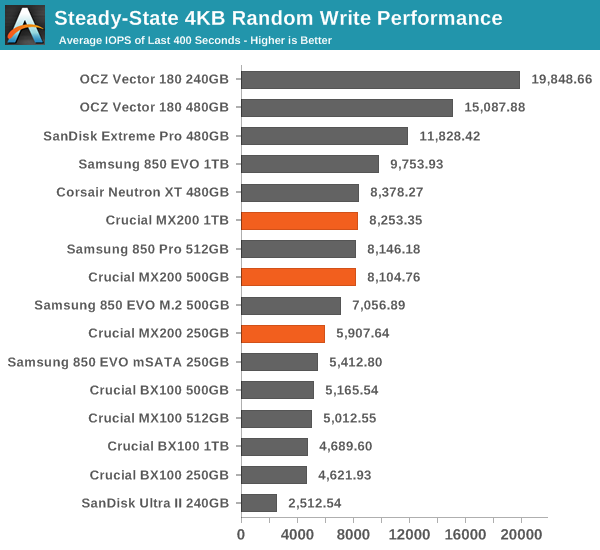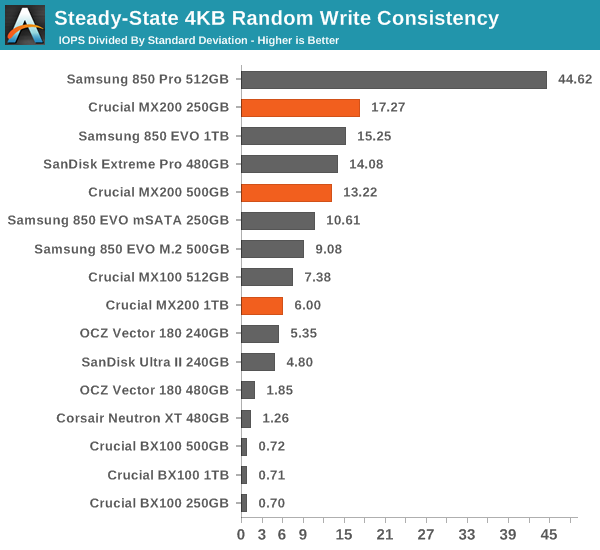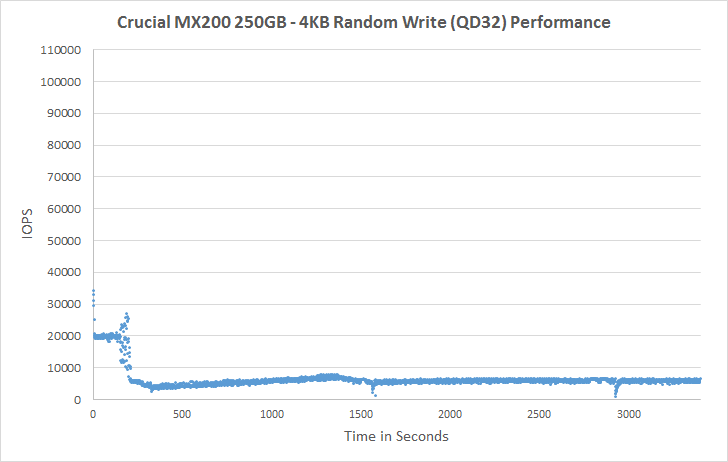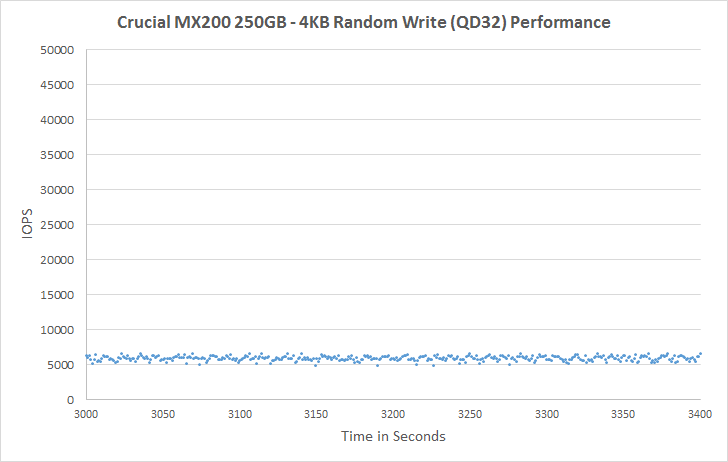Crucial MX200 (250GB, 500GB & 1TB) SSD Review
by Kristian Vättö on May 22, 2015 8:00 AM EST- Posted in
- Storage
- SSDs
- Crucial
- MX200
- Micron 16nm
Performance Consistency
We've been looking at performance consistency since the Intel SSD DC S3700 review in late 2012 and it has become one of the cornerstones of our SSD reviews. Back in the days many SSD vendors were only focusing on high peak performance, which unfortunately came at the cost of sustained performance. In other words, the drives would push high IOPS in certain synthetic scenarios to provide nice marketing numbers, but as soon as you pushed the drive for more than a few minutes you could easily run into hiccups caused by poor performance consistency.
Once we started exploring IO consistency, nearly all SSD manufacturers made a move to improve consistency and for the 2015 suite, I haven't made any significant changes to the methodology we use to test IO consistency. The biggest change is the move from VDBench to Iometer 1.1.0 as the benchmarking software and I've also extended the test from 2000 seconds to a full hour to ensure that all drives hit steady-state during the test.
For better readability, I now provide bar graphs with the first one being an average IOPS of the last 400 seconds and the second graph displaying the IOPS divided by standard deviation during the same period. Average IOPS provides a quick look into overall performance, but it can easily hide bad consistency, so looking at standard deviation is necessary for a complete look into consistency.
I'm still providing the same scatter graphs too, of course. However, I decided to dump the logarithmic graphs and go linear-only since logarithmic graphs aren't as accurate and can be hard to interpret for those who aren't familiar with them. I provide two graphs: one that includes the whole duration of the test and another that focuses on the last 400 seconds of the test to get a better scope into steady-state performance.

It looks like Crucial has finally taken steps to improve steady-state performance, although the additional over-provisioning is partially to thank for the increase. One criticism I always had about Crucial's SSDs was the relatively bad steady-state performance, but the MX200 finally brings the performance closer to other high-end drives.

The consistency is very good as well and far better than what the BX100 offers.
 |
|||||||||
The IO consistency appears to behave differently from the MX100 and the graph resembles 850 EVO and Pro quite a bit by dropping quickly in performance and then slowly increasing before evening out. The 1TB model is an exception, though, as it seems that the firmware can't properly handle such a large capacity, which results in worse performance and considerably higher variation. Unfortunately, the MX200 wouldn't respond to the hdparm command that I use for over-provisioning testing, so I don't have any results with added over-provisioning at this point.
 |
|||||||||










62 Comments
View All Comments
yolomolo - Tuesday, April 19, 2016 - link
Can i get some advice from you PRO, should i better go get mSata : Samsung EVO 850 or CRUCIAL MX200 ?petar_b - Sunday, September 4, 2016 - link
I've been using Crucials 960GB and few OCZs since their early appearance. 24/7 for 3-4 years, all drives work well, health 100% according OCZ and Crucial health tools.(Funny that OCZ Limited Eddition 100GB still works surviving decent load being bought in 2010... after reading Anand's review about SF-1500 inside).
The only alternative I considered was SanDisk Extreme, but I like Enterprise features in Crucial: pseudo-SLC, Power Loss Protection, Redundant Array of Independent NAND, 256-bit encryption. The "Adaptive Thermal Protection" (shutting down unused storage components) allows me to use them 24/7... I wish I know if other drives have these features...
I think a life expectancy is up to 320TBW, while Samsung 850 Pro is maxed out at 150TBW, so maybe performance isn't the best, but I would keep on going with Crucial because I never lost a drive.